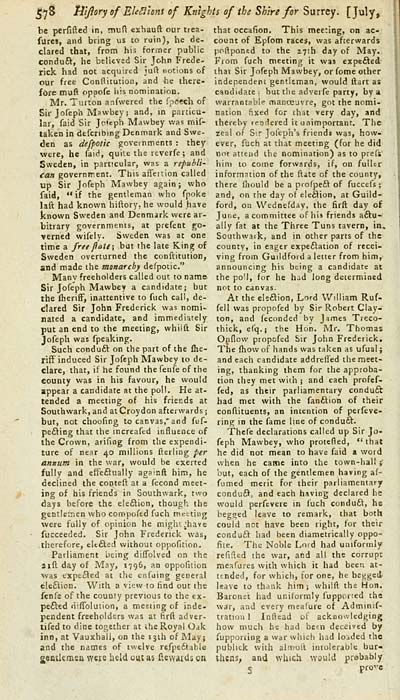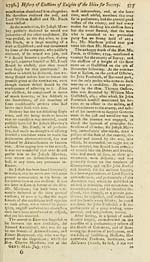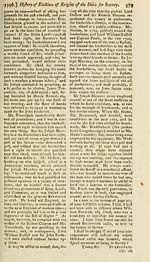Download files
Complete book:
Individual page:
Thumbnail gallery: Grid view | List view

ig^S Htjiory of EliSitoni of Kntghts of ths Sh'tre for Surrey. [July,
be perfiftcd in, mud exhauft our trea-
fures, and bring us to ruin), he de-
clared that, from his former public
conduft, he believed Sir John Frede-
rick had not acquired iuft notions of
our free Conftitution, and he there-
fore muft oppofe iiis nomination.
Mr. Turton anfwered the fjiecch of
Sir Jofeph M^wbey; and, in particu-
lar, faid Sir Jr'epb Mawbey was mif-
taken in defcribmg Denmark and Swc-
den as defpotic governments : they
were, he faid, quite the reverfe; and
Sweden, in particular, was a republi-
can government. This affertion called
up Sir Jofeph Mawbey again ; who
faid, " if the gentleman who fpoke
laft had known hiftory. he would have
known Sweden and Denmark were ar-
bitrary governments, at prefent go-
verned wifely. Sweden was at one
time a free fiate; but the late King of
Sweden overturned the conftitution,
and made the monarchy defpotic."
Many freeholders called out to name
Sir Jofeph Mawbey a candidate; but
the fberifF, inattentive to fuch call, de-
clared Sir John Frederick was nomi-
nated a candidate, and immediately
put an end to the meeting, whiifl; Sir
Jofeph was fpeaking.
Such conduft on the part of the fbe-
rifF induced Sir Jofeph Mawbey to de-
clare, that, if he found the fenfe of the
county was in his favour, he would
appear a candidate at the poll. He at-
tended a meeting of his friends at
Southwark, and at Croydon afterwards ;
but, not choofing to canvas,* and fuf-
pefting that the increafcd influence of
the Crown, arifing from the expendi-
ture of near 40 millions fterling per
annum in the war, would be exerted
fully and efFeftually agpinft him, he
declined the conteft at a fecond meet-
ing of his friends in Southwark, two
days before the eleftion, though the
gentle-.Tien who compofed fuch meeting
were fully of opinion he might ^have
fucceeded. Sir John Frederick was,
therefore, eltfted without oppofition.
Parliament being diffolved on the
aiftdayof May, 1796, an oppofition
was expe6Ved at the cnfaing general
eleftion. With a view 10 find out the
fenfe of the county previous to the ex-
pefted difTolution, a meeting of inde-
pendent freeholders w^is at firft adver-
tifed to dine together at ihe Royal Oak
inn, at Vauxhali, on the i3ih of May;
and the names of twelve refpedtable
gentlemen svere held out as ilewaids on
that occafion. This meeting, on ac-
count of Epfom races, was afterwards
poftpontd to the 27! h day of May.
From fuch meeting it was expefted
that Sir Jofeph iVIawbey, or fome other
independent gentleman, would ilart as
candidate; hut the adverfe party, by a
warrantable mancEuvre, got the nomi-
nation fixed for that very day, and
thereby rendered it unimportant. The
zeal of Sir Jofeph's friends was, how-
ever, fuch at that meeting (for he did
not attend the nomination) as to prefs
him to come forwards, if, on fuller
information of the ftite of the county,
there fiiould be a profpeft of fuccefs ;
and, on the day of eleftion, at Guild-
ford, oa Wednefdav, the firft day of
June, a committee of his friends aftu-
ally fat at the Three Tuns tavern, in.
Southwark, and in other parts of the
county, in eager expeftation of recei-
ving from Guildford a letter from him,
announcing his being a candidate at
the poll, for he had long determined
not to canvas-
At the eleftion, Lord William Ruf-
fell was propofed by Sir Robert Clay-
ton, and feconded by James Treco-
thick, efq. ; the Hon. Mr. Thomas
Ojiflow propofed Sir John Frederick,
The fhow of hands was taken as ufual }
and each candidate addreifed the meet-
ing, thanking them for the approba-
tion they met with ; and each profef-
fed, as their parliamentary conduft
had met with the fanftion of their
conftituents, an intention of perfeve-
ring in the fame line of conduft.
Thefe declarations called up Sir Jo-
feph Mawbey, who protefted, "that
he did not mean to have faid a word
when he came into the town-hall j
but, each of the gentlemen having af-
fumed merit for their parliamentary
conduft, and each having declared he
would perfcvere in fuch conduft, he
heg<»ed leave to remark, that both
could not have been right, for their
conduft had been diametrically oppo-
lite. The Noble Lord had uniformly
refilled the war, and all the corrupt
meafures with which it had been at-
t!.nded, for which, for one, he begged-
leave to thank him; whilft the Hon.
Baronet had uniformly fupponed the
war, and every mealure of Adminif-
tration I Inftead of acknowledging
how much he had been deceived by
fupporcing a war which had loaded the
publick with almoll intolerable bur-
thens, and which would probably
5 PfO"«
be perfiftcd in, mud exhauft our trea-
fures, and bring us to ruin), he de-
clared that, from his former public
conduft, he believed Sir John Frede-
rick had not acquired iuft notions of
our free Conftitution, and he there-
fore muft oppofe iiis nomination.
Mr. Turton anfwered the fjiecch of
Sir Jofeph M^wbey; and, in particu-
lar, faid Sir Jr'epb Mawbey was mif-
taken in defcribmg Denmark and Swc-
den as defpotic governments : they
were, he faid, quite the reverfe; and
Sweden, in particular, was a republi-
can government. This affertion called
up Sir Jofeph Mawbey again ; who
faid, " if the gentleman who fpoke
laft had known hiftory. he would have
known Sweden and Denmark were ar-
bitrary governments, at prefent go-
verned wifely. Sweden was at one
time a free fiate; but the late King of
Sweden overturned the conftitution,
and made the monarchy defpotic."
Many freeholders called out to name
Sir Jofeph Mawbey a candidate; but
the fberifF, inattentive to fuch call, de-
clared Sir John Frederick was nomi-
nated a candidate, and immediately
put an end to the meeting, whiifl; Sir
Jofeph was fpeaking.
Such conduft on the part of the fbe-
rifF induced Sir Jofeph Mawbey to de-
clare, that, if he found the fenfe of the
county was in his favour, he would
appear a candidate at the poll. He at-
tended a meeting of his friends at
Southwark, and at Croydon afterwards ;
but, not choofing to canvas,* and fuf-
pefting that the increafcd influence of
the Crown, arifing from the expendi-
ture of near 40 millions fterling per
annum in the war, would be exerted
fully and efFeftually agpinft him, he
declined the conteft at a fecond meet-
ing of his friends in Southwark, two
days before the eleftion, though the
gentle-.Tien who compofed fuch meeting
were fully of opinion he might ^have
fucceeded. Sir John Frederick was,
therefore, eltfted without oppofition.
Parliament being diffolved on the
aiftdayof May, 1796, an oppofition
was expe6Ved at the cnfaing general
eleftion. With a view 10 find out the
fenfe of the county previous to the ex-
pefted difTolution, a meeting of inde-
pendent freeholders w^is at firft adver-
tifed to dine together at ihe Royal Oak
inn, at Vauxhali, on the i3ih of May;
and the names of twelve refpedtable
gentlemen svere held out as ilewaids on
that occafion. This meeting, on ac-
count of Epfom races, was afterwards
poftpontd to the 27! h day of May.
From fuch meeting it was expefted
that Sir Jofeph iVIawbey, or fome other
independent gentleman, would ilart as
candidate; hut the adverfe party, by a
warrantable mancEuvre, got the nomi-
nation fixed for that very day, and
thereby rendered it unimportant. The
zeal of Sir Jofeph's friends was, how-
ever, fuch at that meeting (for he did
not attend the nomination) as to prefs
him to come forwards, if, on fuller
information of the ftite of the county,
there fiiould be a profpeft of fuccefs ;
and, on the day of eleftion, at Guild-
ford, oa Wednefdav, the firft day of
June, a committee of his friends aftu-
ally fat at the Three Tuns tavern, in.
Southwark, and in other parts of the
county, in eager expeftation of recei-
ving from Guildford a letter from him,
announcing his being a candidate at
the poll, for he had long determined
not to canvas-
At the eleftion, Lord William Ruf-
fell was propofed by Sir Robert Clay-
ton, and feconded by James Treco-
thick, efq. ; the Hon. Mr. Thomas
Ojiflow propofed Sir John Frederick,
The fhow of hands was taken as ufual }
and each candidate addreifed the meet-
ing, thanking them for the approba-
tion they met with ; and each profef-
fed, as their parliamentary conduft
had met with the fanftion of their
conftituents, an intention of perfeve-
ring in the fame line of conduft.
Thefe declarations called up Sir Jo-
feph Mawbey, who protefted, "that
he did not mean to have faid a word
when he came into the town-hall j
but, each of the gentlemen having af-
fumed merit for their parliamentary
conduft, and each having declared he
would perfcvere in fuch conduft, he
heg<»ed leave to remark, that both
could not have been right, for their
conduft had been diametrically oppo-
lite. The Noble Lord had uniformly
refilled the war, and all the corrupt
meafures with which it had been at-
t!.nded, for which, for one, he begged-
leave to thank him; whilft the Hon.
Baronet had uniformly fupponed the
war, and every mealure of Adminif-
tration I Inftead of acknowledging
how much he had been deceived by
fupporcing a war which had loaded the
publick with almoll intolerable bur-
thens, and which would probably
5 PfO"«
Set display mode to: Large image | Transcription
Images and transcriptions on this page, including medium image downloads, may be used under the Creative Commons Attribution 4.0 International Licence unless otherwise stated. ![]()
| Early Gaelic Book Collections > Ossian Collection > Gentleman's magazine, and historical chronicle > Volume 66, Part 2 > (50) |
|---|
| Permanent URL | https://digital.nls.uk/79422371 |
|---|
| Description | Selected books from the Ossian Collection of 327 volumes, originally assembled by J. Norman Methven of Perth. Different editions and translations of James MacPherson's epic poem 'Ossian', some with a map of the 'Kingdom of Connor'. Also secondary material relating to Ossianic poetry and the Ossian controversy. |
|---|
| Description | Selected items from five 'Special and Named Printed Collections'. Includes books in Gaelic and other Celtic languages, works about the Gaels, their languages, literature, culture and history. |
|---|

